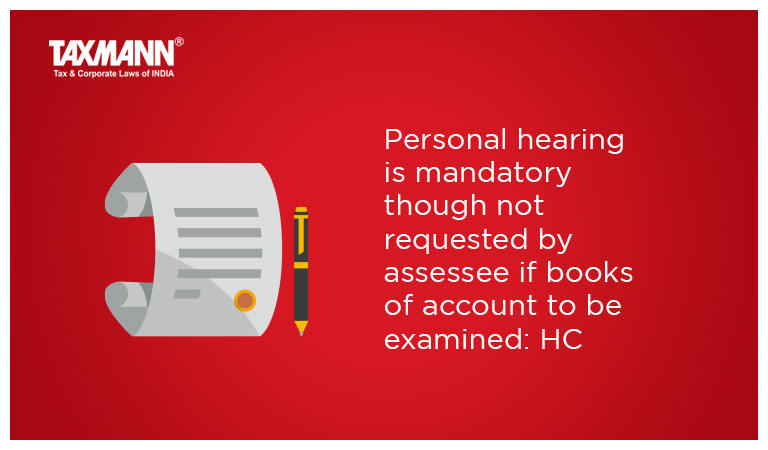Personal hearing is mandatory though not requested by assessee if books of account to be examined: HC
- Blog|News|Income Tax|
- 2 Min Read
- By Taxmann
- |
- Last Updated on 5 July, 2022

Case Details: Vamsha Retail Ventures (P.) Ltd. v. ACIT - [2022] 139 taxmann.com 336 (Madras)
Judiciary and Counsel Details
-
- C. Saravanan, J.
- R. Sivaraman for the Petitioner.
- N. Dilipkumar, Sr. Standing Counsel for the Respondent.
Facts of the Case
A survey was conducted at the premises of the assessee during which a hard disk of the computer containing tally software details was found and seized. Under tally software, the assessee had declared a gross profit of Rs. 5.65 crores approx. However, it filed its regular return of income and declared the net profit as Rs. 3.32 crores (approx.)
The Assessing Officer (AO) held that the difference between the net profit was reported for the assessment year to the tune of Rs. 2.33 crores [Rs. 5.65 crores – Rs. 3.32 crores] should be treated as undisclosed business income of the assessee and made addition accordingly.
The assessee contended that the accounts in the Tally software were a draft and unaudited balance sheet, wherein the profit declared in ITR was refined and audited. AO rejected the assessee’s contention and passed the order. The assessee filed writ petition before the Madras High Court.
High Court Held
The High Court held that the undisclosed business profit had been arrived from the net profit in the books of account as on the date of the survey and the amounts declared in the income tax. This would have definitely required a proper assessment by calling the petitioner for a personal hearing.
Though the assessee had not specifically requested for a personal hearing, the fact remains that where the books of account have to be examined for arriving at a proper conclusion, a personal hearing is mandatory.
Therefore, there was a procedural infraction in the assessment order passed by AO. The matter was remitted back to AO to pass an appropriate order preferably within a period of three months from the date of receipt of the copy of this order.
List of Cases Referred to
-
- EShakti.com (P.) Ltd. v. Asstt. CIT [W.P. Nos. 1260 and 1264 of 2020, dated 17-6-2021] (para 8).
Disclaimer: The content/information published on the website is only for general information of the user and shall not be construed as legal advice. While the Taxmann has exercised reasonable efforts to ensure the veracity of information/content published, Taxmann shall be under no liability in any manner whatsoever for incorrect information, if any.

Taxmann Publications has a dedicated in-house Research & Editorial Team. This team consists of a team of Chartered Accountants, Company Secretaries, and Lawyers. This team works under the guidance and supervision of editor-in-chief Mr Rakesh Bhargava.
The Research and Editorial Team is responsible for developing reliable and accurate content for the readers. The team follows the six-sigma approach to achieve the benchmark of zero error in its publications and research platforms. The team ensures that the following publication guidelines are thoroughly followed while developing the content:
- The statutory material is obtained only from the authorized and reliable sources
- All the latest developments in the judicial and legislative fields are covered
- Prepare the analytical write-ups on current, controversial, and important issues to help the readers to understand the concept and its implications
- Every content published by Taxmann is complete, accurate and lucid
- All evidence-based statements are supported with proper reference to Section, Circular No., Notification No. or citations
- The golden rules of grammar, style and consistency are thoroughly followed
- Font and size that’s easy to read and remain consistent across all imprint and digital publications are applied



 CA | CS | CMA
CA | CS | CMA
